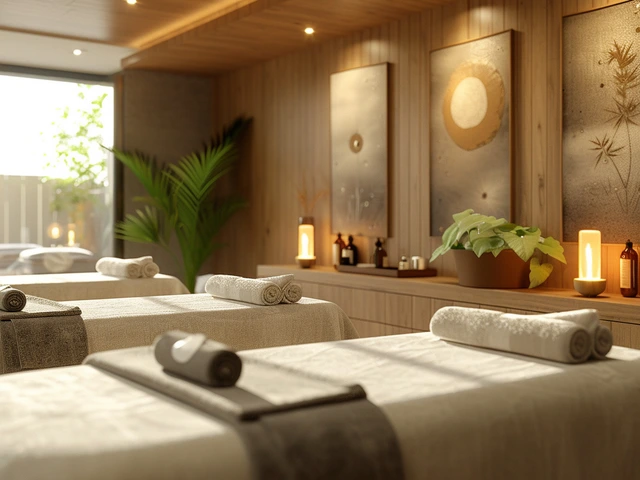
Introduction
In our ceaseless pursuit of balance amidst the whirlwind of daily life, finding moments of quietude and self-care can often seem like finding water in a desert. Among the oases of well-being practices, Thai massage stands out as a profound sanctuary, offering not just physical relief but fostering a deeper connection between body and soul. Originating from the ancient healing traditions of Thailand, this unique form of massage has transcended time and borders to become a celebrated component of holistic health and well-being worldwide.
The Origins and Philosophy of Thai Massage
The roots of Thai massage stretch back over 2,500 years, intertwining with the spiritual teachings of Buddhism. It's said that the founder of this healing practice was Jivaka Kumar Bhaccha, a physician to Buddha himself. This illustrious origin story underlines the deeply spiritual ethos of Thai massage, which goes beyond mere physical manipulation to touch the core of one’s being.
Unlike Western massage techniques that primarily focus on muscle relaxation through direct pressure, Thai massage operates on the belief that life energy, or 'Prana', circulates within the body along predefined pathways known as 'Sen'. Health in this context is understood as the unhindered flow of this vital energy. Thai massage, therefore, aims to clear any blockages in these paths, rejuvenating both the mind and the physical body in the process.
The Unique Techniques of Thai Massage
The hallmark of Thai massage lies in its dynamic combination of stretching, compressions, and acupressure. Practitioners use their hands, elbows, knees, and feet to apply pressure along the Sen lines while guiding the recipient through a series of yoga-like stretches. The experience is often described as having yoga done to you, sans the effort required to hold the poses yourself.
This distinctive approach not only enhances flexibility but also boosts the circulatory system, promotes relaxation, and improves the range of motion. It's a comprehensive workout for the body, sans the sweat and toil typically associated with exercise. Delivered on a comfortable floor mat, with recipients fully clothed, Thai massage sessions are an intimate dance between giver and receiver, choreographed for healing.
Comprehensive Health Benefits of Thai Massage
Embarking on the Thai massage journey ushers in a spectrum of health advantages, some immediate and others that unfold with regular sessions. Perhaps its most lauded benefit is the profound relaxation and decrease in stress levels participants experience. By promoting the flow of Prana, mental clouds disperse, offering clarity and calm in their stead.
According to a study published in the Journal of Bodywork and Movement Therapies, Thai massage significantly reduces stress and anxiety, while improving energy levels and general well-being.
Other notable benefits include pain relief, particularly in the back, shoulders, and neck; enhancement of the immune system; improved sleep quality; and alleviation of headaches. The dynamic stretches and manipulations also aid in improving posture and flexibility, making Thai massage an ideal practice for everyone from office workers to athletes.
How to Incorporate Thai Massage into Your Self-Care Routine
Integrating Thai massage into your self-care arsenal requires no more than a willingness to commit to your own well-being. It's advisable to begin with sessions spaced a month apart to acclimate your body to the techniques and benefits, gradually moving to more frequent sessions as your body demands. Listening to your body is key; it will signal when it's time for another healing session.
When choosing a practitioner, look for someone with accredited training and experience in traditional Thai massage. This ensures you receive the authentic benefits of the practice. Additionally, communicate openly with your therapist about any discomfort or specific areas needing attention to tailor the experience to your body's needs.
Tips for Maximizing the Benefits of Thai Massage
To fully embrace the health benefits of Thai massage, a few preparatory steps and post-session practices can enhance your experience. Hydrating well before and after your massage facilitates the release of toxins, while light meals prior to your session can prevent discomfort. Post-massage, taking time for gentle stretching and quiet meditation can extend the state of relaxation and integration of the massage’s benefits.
Moreover, embracing a mindset of mindfulness and presence during your session can profoundly impact the depth of benefits achieved. It’s an opportunity to tune into your body’s subtle signals, fostering a deeper inner connection and awareness.
Conclusion
As we navigate the complexities of modern life, Thai massage offers a sanctuary for self-care that is both ancient and profoundly relevant. Its holistic approach to health – nurturing the mind, body, and spirit – provides a comprehensive antidote to the stresses of everyday life. Whether seeking relief from physical discomfort, emotional burdens, or simply aspiring for deeper physical and mental well-being, Thai massage stands as a testament to the enduring power of traditional healing practices. Embracing it as part of your self-care ritual opens up a world of rejuvenation, balance, and holistic health – a true gift to oneself in the quest for harmony and vitality.




